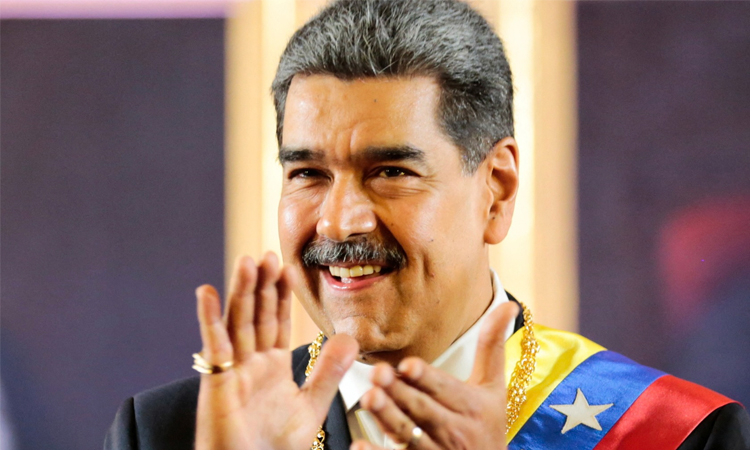News Flash
News Flash

CARACAS, May 21, 2025 (BSS/AFP) - Ten months after his disputed reelection, Venezuela's authoritarian leftist President Nicolas Maduro is aiming to complete his sweep of power in parliamentary and regional elections on Sunday that the opposition has vowed to boycott.
Venezuelans are called on to elect 24 state governors and 285 national assembly members, but turnout is expected to be low.
Many opposition supporters lost any remaining faith they had in the electoral process after July's presidential election, in which Maduro claimed a third term despite the opposition's vote tally showing a clear win for its candidate, Edmundo Gonzalez Urrutia.
That election, and the deadly crackdown that followed it, cemented Venezuela's pariah status on the world stage.
Only a handful of countries, including longtime allies Russia and Cuba, recognized Maduro's reelection.
The 62-year-old socialist has reacted defiantly, repeatedly alleging US-backed plots to topple him.
On the eve of the vote, the government claimed it had captured a group of foreign mercenaries that infiltrated the country from Colombia to sabotage the election.
Over 400,000 security personnel will be deployed for the election on Sunday, which will also take place in Essequibo, an oil-rich region on Venezuela's border with Guyana, which Guyana has administered for decades but Caracas has threatened to partially annex.
The opposition's boycott plans have generated intense debate.
Jesus Castillo, director of the Polianalitica political consultancy, deemed them a "tactical error" by what he called the "radical wing" of the opposition.
In the absence of alternatives, "the map (of Venezuela) will be very red," he added, referring to the color of "Chavismo," the brand of anti-American left-wing nationalism Maduro inherited from his predecessor, Hugo Chavez.
Polls show Maduro's United Socialist Party of Venezuela and its allies winning an absolute majority in parliament.
The opposition is only tipped for victory in two of 24 states: Zulia state, home to Venezuela's oil capital of Maracaibo, and Nueva Esparta, which comprises the Caribbean tourist island of Margarita, among others.
Yaczon Rivas, a 46-year-old trade unionist in the construction sector, told AFP he would vote for Maduro as a bulwark against US President Donald Trump, who has tightened sanctions on Venezuela since returning to power in January.
"We are dealing with a satanic enemy but we have a president who, despite all our problems, is implementing sound policies," Rivas said.
- 'We have to fight' -
In a Zoom interview with AFP last week, opposition leader Maria Corina Machado, who has been in hiding since the July election, called Sunday's vote "a farce" aimed at "burying Maduro's defeat" last year.
Henrique Capriles, a two-time former presidential candidate who heads a smaller opposition movement, argues, however, that change can only come about through the ballot box.
In 2020, a boycott of parliamentary elections allowed Maduro's allies to regain control of the assembly from the opposition and pass increasingly oppressive laws.
The opposition also boycotted 2018 presidential elections in which Maduro claimed to have won a second term -- a claim also rejected as fraudulent by most of the international community.
"I understand people's frustration... but we have to fight. That's the price of democracy and we will win it back," said Juan Requesens, a former MP running for governor of Miranda state on behalf of Capriles's movement.
But on the streets of the capital, Requesens struggled to make his case.
"Vote for what? I support neither the scorpions nor the government," said Santo Reinoza, a 76-year-old pensioner from the low-income Carapita neighborhood, using a derogatory term for opposition politicians who reject the boycott.
Arantxa Martinez, a 24-year-old student, said, however, that she would cast a ballot for Requesens.
"Since I've been born I've only known this government," she said, adding: "Staying at home, waiting for things to change, is not an option."